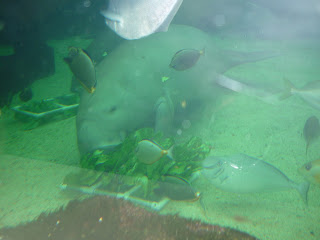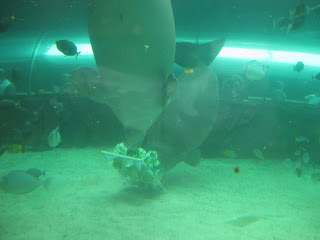We saw Dugongs 'Pig' and 'Waru' today at Sydney Aquarium :)

Eating their cos lettuce in captivity which is the closest thing to wild sea grass in nutritional value. They are very fussy eaters and would usually graze on of sea grass in the wild by digging them up with their bristled snout.. they are sooo cute and one of my favourite animals aside from the orangutan and the rabbit lol.. We just happened to be standing directly where they were when they dropped the lettuce trays in :)
VIDEO I TOOK TODAY:

Eating their cos lettuce in captivity which is the closest thing to wild sea grass in nutritional value. They are very fussy eaters and would usually graze on of sea grass in the wild by digging them up with their bristled snout.. they are sooo cute and one of my favourite animals aside from the orangutan and the rabbit lol.. We just happened to be standing directly where they were when they dropped the lettuce trays in :)
VIDEO I TOOK TODAY:
MORE PHOTOS WE TOOK:
Article Shared: SMH.com.au
IF YOU think your children are fussy eaters, you haven't met Pig and Waru. Sydney Aquarium's dugongs are so picky they eat only cos lettuce leaves, except on the rare occasion they can be persuaded to try a bunch of spinach.
A delivery of more than 200 kilograms of cos lettuce arrives at the aquarium every day. And they are fed only lettuce leaves good enough for human consumption.
''They're fed non-stop from 7.30am till 9pm,'' said the senior aquarist, Andrew Barnes.
With such a low-energy diet it is hard to believe both animals weigh more than 300 kilograms. The lettuce is washed, chopped and sorted before it is threaded into trays that are placed on the bottom of their enclosure.
''If they are eating quickly they can go through two trays every five minutes,'' Mr Barnes said.
Cos lettuce is the closest substitute for the sea grass dugongs consume in the wild. But despite the pair's healthy appetites, almost 70 kilograms of lettuce is wasted each day.
''Some of the leaves they don't eat because they're pretty picky,'' Mr Barnes said. ''Then some of the leaves dislodge from the trays and float to the surface.''
Sydney Aquarium has leftovers of almost 500 kilograms of the lettuce each week. But instead of throwing it away, the aquarium sends it to a Sydney electricity company which turns it into electricity and fertiliser using a process called anaerobic digestion.
Pig and Waru are among only six dugongs held in captivity. Both animals were found without their mothers in northern Queensland when they were just a few days old.
Apart from eating, the pair spend most of their day playing with the other inhabitants of their enclosure, including leopard rays, shovel-nose sharks and tropical fish.













